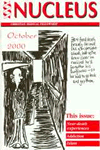'The outstanding achievement not only of our time but in human history.’ So declared Michael Dexter, Director of the Wellcome Trust, in June following the joint announcement by the Human Genome Project and Celera Genomics that they had deciphered the 3.1 billion letters of human DNA. It has been claimed that this will alter the whole basis of medicine and usher in a new era of cancer treatments, vaccines, personalised pills, extended lifespan and treatments for genetic diseases. There is no doubt that there is great therapeutic potential, but when will real benefits emerge? And what are the dangers?
We need to be careful not to overstate the facts. Last June’s ‘milestone’ was simply the production of a ‘working draft’. 97% of the human genome has been mapped and 85% sequenced so far; containing 38,000 genes and 115,000 possible genes. A high resolution map may take another three years - and even then we will only be beginning the task of identifying the function of the individual DNA sequences. Finding treatments based on them will follow that.
We are much more than our genes; human beings are a complex product of nature, nurture and personal choice. The relationship between genes and disease is often not simple; and patterns of inheritance and the likelihood of a particular gene being expressed are not easily predictable. Also, despite the hype, gene therapy results are so far disappointing. In the last ten years, over 30 major gene companies have been launched and several thousand people treated but as yet only very small numbers of people with rare conditions (like severe combined immune deficiency) have been helped.
However, ‘genetic selection’ is already taking place in the UK. Prenatal screening and abortion mean that 90% of children detected in utero with Down’s syndrome never see the light of day; and pre-implantation diagnosis and embryo disposal for cystic fibrosis, Tay-Sachs disease and muscular dystrophy is now well-established.
There are strong moves to deploy this technology more widely, to identify and eliminate individuals before birth with a much broader range of genetic disorders, on the pretext of ‘cost-effectiveness’. According to research it costs £80,000 to detect and abort one Down’s baby and £120,000 to cover a lifetime’s cost of care. The tragedy is that this ante-natal ‘search and destroy’ is taking place at a time when there are many breakthroughs for previously untreatable genetic conditions. For example, the life expectancy for cystic fibrosis has doubled in recent years, along with a vast improvement in quality of life. Genetic selection devalues handicapped people and means channelling funds away from finding new therapies.
We must not underplay the considerable physical, financial and psychological cost of raising children with special needs, but the way we treat the most vulnerable members of our community speaks volumes about the sort of society that we are. Christian ethics is not about the survival of the fittest; it’s about bearing one another’s burdens and making sacrifices for the weak and vulnerable.
The use of genetic fingerprinting to identify criminals must be welcomed if it makes it more likely that the guilty are brought to justice and the innocent are exonerated. However, confidential genetic information could also be used by corrupt governments to exploit vulnerable groups - or by employers and insurance companies to discriminate against those with special needs.
The Human Genome Project will need financial investment to produce results; but with biotechnology stocks already in high demand, there is the danger that human greed rather than human need will shape research priorities. In addition, any valuable treatments developed may be out of reach of the price range of poorer families, and indeed poor (or even rich) countries. Gene patents are another area for concern. Investors are keen to get a return - but should genes, which are discoveries and not inventions, be subject to this kind of commercial exploitation? If they are, this will encourage hoarding of intellectual property by those out to make a fast buck. If not, research might suffer.
As Bill Clinton has reminded us already, the Human Genome Project is helping us understand ‘the language in which God created life’. The wonder of the genetic code reminds us that we carry the master-designer’s fingerprints - each one of us individually crafted in his image - yet each different. This same God calls us to be stewards of his creation. The scientific exploration of life, including its genetic foundation, is right and good, but we must ensure we use this new information in ways that glorify him. For people and not against them. Not to exploit, but to serve. Personally, I’m still looking to the resurrection, rather than the genetic revolution, for perfect health and extended lifespan.
































